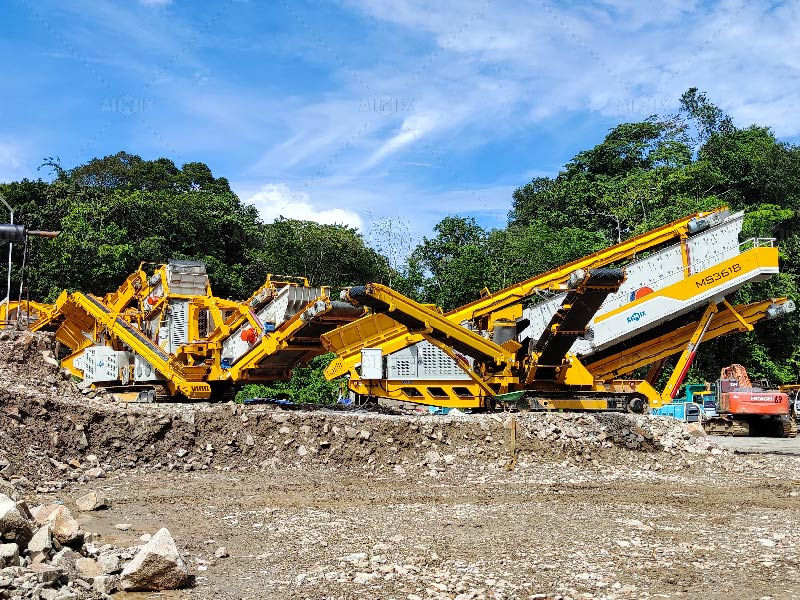Uninterrupted Production: How to Keep the Aggregate Crusher Plant Running Continuously in the Rainy Season
- info515452
- 7月21日
- 讀畢需時 3 分鐘
The rainy season often brings a series of operational challenges to the mining and aggregate industries. Excessive moisture can cause raw materials to become sticky, clogging hoppers, chutes, and screens. Wet conditions also increase the risk of equipment wear and safety incidents. For an aggregate crusher plant(planta trituradora de agregados), unplanned downtime during rainy months can lead to significant productivity losses. However, with the right strategies, you can maintain smooth, uninterrupted production regardless of the weather.
Understanding the Impact of Rain on Crushing Operations
Rain affects nearly every stage of aggregate production. From excavation to final stockpiling, water alters material consistency, reduces equipment efficiency, and increases handling difficulties. A stone crusher plant working in wet conditions can suffer from reduced throughput, frequent blockages, and premature wear of components such as belts, liners, and screens.
Moreover, electrical systems, engine ventilation, and control panels are all vulnerable to moisture. If not adequately protected, they can fail under exposure, leading to costly repairs and longer downtimes.

Weatherproofing the Site Infrastructure
Improve Drainage Systems
Effective drainage is the first line of defense against water accumulation. Ensure that all working areas, especially near the aggregate crusher plant, have sloped surfaces to direct water away from machinery. Trenches and underground drainage pipes should be cleared and maintained regularly.
Cover Material Stockpiles
Use waterproof covers or build covered storage areas to keep aggregates dry. Wet aggregates not only slow down crushing efficiency but also risk contaminating batches intended for specific end uses like asphalt or ready-mix concrete.
Shelter Key Equipment
Install temporary or permanent shelters over critical components of your stone crusher plant(planta trituradora), especially control systems, engines, and conveyor motors. If full shelters are not feasible, prioritize moisture-prone zones and insulate wiring and electronics with water-resistant enclosures.
Equipment Adaptations for Wet Conditions
Use Mobile Units for Flexibility
In some cases, deploying a mobile stone crusher allows you to relocate equipment to drier ground during peak rainfall or avoid areas with poor drainage. Their flexibility in movement can be a huge advantage for sites with seasonal terrain challenges.
Apply Anti-Clogging Measures
Screening and crushing parts should be equipped with anti-clogging technologies such as vibration-enhanced feeders or rubber-tensioned screens. Operators should also consider adjusting feed rates and angles to help wet material flow more freely.
Maintain Proper Lubrication
Moist environments accelerate rusting and wear. Regularly check and replenish lubricants, and consider using water-resistant greases in exposed areas of your aggregate crusher plant. Create a scheduled maintenance calendar specifically for the rainy season.
Operational Adjustments During Rainy Days
Monitor Material Moisture Content
Wet raw materials can significantly increase the load on crushers and conveyors. Use moisture sensors or manual checks to assess whether materials need air-drying or delay before feeding into the system. Controlling input quality helps maintain throughput and equipment safety.
Train Operators for Emergency Protocols
Operators should be trained to respond quickly in the event of flooding, electric faults, or machine blockages. Preparing for worst-case scenarios reduces downtime and ensures staff safety.
Adjust Output Expectations
It’s important to realign production targets according to weather conditions. Rather than pushing machines beyond safe limits, focus on maintaining stable, lower-output production to ensure long-term system health.
Long-Term Planning for Rainy Season Resilience
Seasonal weather should not catch aggregate producers unprepared. Invest in site assessments before the rainy season begins, reviewing soil absorption capacity, equipment placement, and waterproofing efficiency. Incorporate weather-related risk factors into your annual budget and operation plans.
Modern control systems can help too. Many mobile stone crusher(trituradora movil de piedra) units now come with smart monitoring that alerts operators to changes in material flow, motor load, or temperature—making real-time adjustments easier than ever.
Conclusion
Operating an aggregate crusher plant during the rainy season requires more than just reactive maintenance. It demands proactive planning, infrastructure upgrades, and intelligent equipment choices. By preparing for the rain before it arrives, producers can minimize disruption, maintain productivity, and protect their investment. Whether you run a stationary or mobile stone crusher, ensuring year-round reliability starts with understanding your environment and optimizing your systems accordingly.






留言